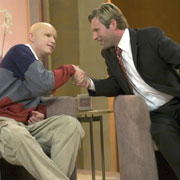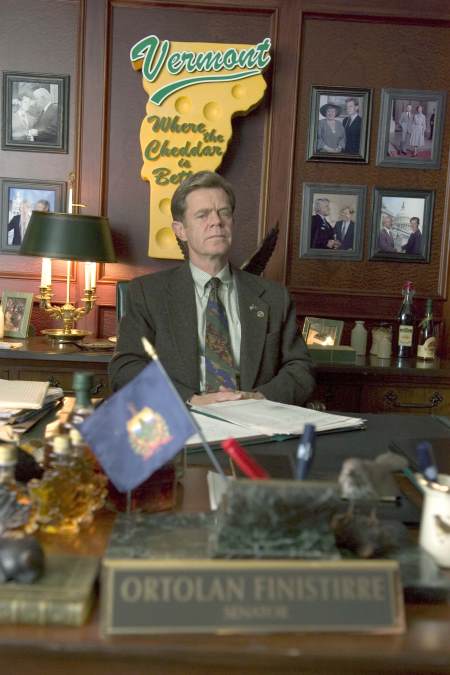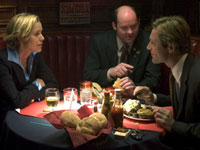

|
Thank You For Smoking
6 out of 10 |
 |
|
Is There A Spin Doctor In The House? Nick Naylor is a very charming man. He is the sort of person who could sell refrigerators in Siberia and make them feel they had gotten a great bargain. In "Thank You For Smoking", Nick (played by Aaron Eckhart) is the top spin doctor for big tobacco, in their neverending defense of the right of smokers to kill themselves (and anyone around their second-hand smoke) in order to make a profit. This comedy works off of the hero being such a loveable guy doing such a hateful job and off the sharp satire which pokes fun at do-gooders, journalists, Hollywood and more. The villains of the piece are the earnest do-gooders such as Senator Ortolan Finistirre (too obviously PC) and some nameless health terrorists (illegal and violent actions) who just aren't likeable and smooth. The other villain is a villainess, the conniving reporter Heather Holloway (Katie Holmes), who is really a female Nick Naylor. Her cinematic sin is sleeping with our hero and then using his pillow talk to write a damning article for her paper. This somehow comes across as being much worse than what Naylor does and she appropriately gets her comeuppance in the end. Incidentally, the audience was originally going to be treated to the sight of Ms. Holmes delectable mammaries, which are referred to several times by Nick's friends in the MOD squad (Merchants of Death), being fellow lobbyists for the alcohol and firearms industries. According to industry gossip, Katie Holme's partial nudity was another victim of (Tom) Cruise control. What with pulling of the now-infamous South Park episode, you have to wonder if Tom Cruise is becoming his own personal censorship board. Nick says he is "just doing what it takes to pay the mortgage" (while internally referring to the phrase as the "Yuppie Nuremburg Defence") but that is not what really motivates him. He is actually secretly getting off on the fact that he is contributing to the deaths of hundreds of thousands of people per year through his ability to talk on behalf of smoking. This slips out in a little scene with his fellow MOD-squadders when he suggests that he is the only one there worthy of death threats and justifies it by comparing how many people per day each industry kills. There is another telling scene where Naylor delivers a case of tax-free cash to the embittered and diseased Marlboro Man (played by Sam Elliott) and manages to cleverly stifle his outrage and seduce him into deciding for himself to take the money. His son Joey (Cameron Bright of Ultraviolet) asks him afterwards how he knew he would take the cash and Nick replies that you'd have to be crazy to turn down that much money. Joey thinks about it briefly and agrees. In thinking about this scene afterwards, I could only describe Naylor's actions as 'evil', but at the time I found them clever and psychologically sophisticated. The climax of the film occurs The climax of the film occurs when Nick appears before a Senate Committee hearing on whether a skull and crossbones should be printed on each cigarette package and uses the personal choice argument and the relative dangers argument to great effect. He puts his questioners on the defensive, but does have to decide whether he would let his son smoke once he was legally old enough. Nick squirms but decides for personal liberty and truth and says that if Joey wants to smoke then, he'll buy him his first pack himself. He exits triumphant and starts his own lobbying firm. Jason Reitman is making his full-length directoral debut in this film after making several critically-acclaimed shorts (usually about the advertising business). He is at his sharpest in this movie when Naylor discusses argument vs negotiation or how you can imply your view is right by showing your opponent is wrong (which is a logical error virtually every member of the human race makes much of the time). You have to wonder if Reitman hasn't gone far enough from his roots, and whether he will be able to do as well directing an action film or chick flick instead. This is a very entertaining film with sharp dialogue and it did make this reviewer think. Having said all that, it's a comedy that is not an obvious date movie or one that targets a large and identified movie-going audience, so it will be interesting to see what kind of box-office "Thank You For Smoking" does. It will certainly be worth a rental when the DVD comes out. In the end, the moral of this movie appears to be that to be cool and fast-talking is more important than wheher you are doing good or evil. This is not a surprising message nowadays, but it is delivered here in a disturbingly clever way. Evil may not be cool, but apparently Good is definitely uncool.
Film Critic: Douglas Gunter    |
|